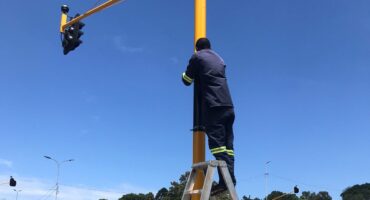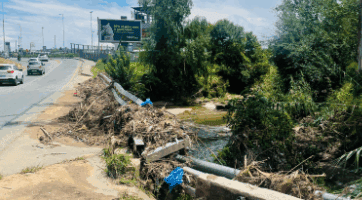Covid-19: Gauteng Premier unpacks the province’s move to Level 3
Premier David Makhura said that the move to Level 3 is not without risks but they are working to mitigate those risks.

Gauteng Premier David Makhura delivered a briefing on 29 May on how the province will respond to Level 3 of lockdown.
Makhura said their focus remains the six pillars of their Covid-19 response. This includes a comprehensive health response, food security and social relief, enhancing the capacity of the state, economic response, social mobilisation and human solidarity and law enforcement and compliance.
He said that Gauteng currently contributes 12 per cent of national confirmed cases. In April, Gauteng accounted for over 50 per cent of cases. The province currently accounts for 10 per cent of active cases. In the past eight days, there has been an increase of 829 positive cases. There has been a 61 per cent recovery rate and the mortality rate is at 1.1 per cent. The number of active cases is at 38 per cent.
He highlighted that the mining sector has contributed to 21 per cent of new cases over the past eight days. He said that Ekhuruleni North 1 and North 2 were a concern due to a cluster outbreak from a factory in Centurion. “We have been able to contain that area…Ekhuruleni is no longer a concern thanks to the measures we have put in place. The key focus is now the West Rand.”
A hotspot is an area which has more than five positive cases per 100 000 people. Three major metros in Gauteng have been identified as hotspots. These include Johannesburg, Ekhuruleni and Tshwane. Makhura added, “We have identified the West Rand as a hotspot because of the number of cases we have in that area over the last eight days… Given what’s happening in the mining areas in the West Rand, we ourselves have identified it as a hotspot because of the number of cases in that area.”
He said that they have been working with the mines to test more employees and they have tested more people in the surrounding communities. “We have quarantined all the contacts that we have traced and we’re working with the mines to ensure all the hygiene and social distancing measures are in place.”
Makhura highlighted that initial hotspots in the province were in the suburbs and they have learned a lot from dealing with those. “In the suburbs, it was easy to self-quarantine but we had to do a lot of contact tracing.”
He said that just because an area is highlighted as a hotspot, it doesn’t need to stay that way and this is where interventions have been successful. “We have also enhanced our hotspot strategy which will go beyond what we were doing before which included testing, contact tracing, isolation or quarantine.”
However, as the hotspots move to informal settlements, they need to take a different approach. “We have teams at ward level and now, every day when we receive info from the NICD, the following day we break down those numbers… into the number of people in every ward and community.”
Life must carry on
Makhura highlighted that they aren’t able to prevent the spread of the virus but they can put measures in place to slow its spread.
He said that closing the economy is not sustainable and they need to ensure that people can earn a livelihood. “We may be in this for two years, that’s what scientists are saying. Earlier on it was thought that within three months we’d be over the peak… that is why the measures to protect and save lives must co-exist with opening the economy.”
He said that there is no progress without risk and they have put measures in place to help minimise this risk. “This is uncharted waters, we welcome criticism.”
He highlighted that, of course, there is a risk for increased infections as the country moves to Level 3 but that the economy can’t remain closed forever and they need to mitigate the risk as much as possible.
“We want to make sure that we contain the spread.” He said that when they notice a hotspot, they mobilise resources to contain the spread and will continue to do so in the future.
“We are preparing for the worst, we are ready across the province and whatever comes our way, we are prepared.”
Ward-based community teams established
He said that the ward-based community teams will be established in every ward in the province and will include public health experts and community health care workers and community leaders. High-risk areas such as shopping malls, places of worship and schools
“To tackle this pandemic at the scale required, it can’t be government alone. Especially to get people to change behaviour, it can’t be the police going around to police the behaviour of people… this is a collective effort to ensure we all comply.”
“The Gauteng hotspot strategy is a comprehensive strategy based on data on a day-to-day basis and break it down to ward level.” He added that these teams will also be able to provide support to those who have contracted the virus.
“These ward-based teams will help us properly direct where food supply is needed… A ward that has more Covid-19 cases in an area of vulnerability will receive more food security interventions.”
Region A was a big concern in the early days of the virus, however, there are now only 17 active cases. “The recoveries are substantial in that region but we continue to monitor it, especially in areas like Diepsloot and Kya Sands.”
He said that they don’t want to wait until a ward becomes a hotspot but rather use the ward-based teams to ensure that worrying areas do not become hotspots. “We are not just embarking on a Covid-19 project without being informed by data, we are being driven by that.”
In the past eight days, 10 000 people have been immunised. Makhura said that they are targeting those who are most vulnerable such as public health workers, the elderly and those with chronic diseases. They have screened 5.6 million people, surpassing their target of five million. He added that they also had a goal of testing 3 000 people per day and have surpassed that target. “On some days we test over 6 000 people, this testing is targeted and of course we are concerned about the backlog but we know the national government is addressing this.”
There are 203 people who are hospitalised. Of those, 30 are in public facilities while the rest are in the private sector. Five of these people are on ventilators.
Makhura said that, on average, there are 72 people admitted to the hospital each week. He added that this large number of admissions is being monitored closely.
There are 8 301 beds currently available in the public and private sector. There was a stock of 11.4 million personal protective equipment items, which has now gone down to 11.2 million. Makhura added that 166 349 food parcels have been distributed across the province, assisting over 800 000 people. He added that they hope to reach one million people in high-risk and vulnerable areas.
He highlighted that they are doing regular checks at malls and businesses to ensure they are compliant.
Lesufi prepares learners for return to school
MEC for Education, Panyaza Lesufi, said that 300 000 learners and 100 000 teachers and staff members are expected to return to schools on 1 June. The department initially planned to have 4 000 screeners, however, this has since been increased to 10 000.
He said that 3 000 teacher assistants will be employed to assist learners with special needs. There will be 12 000 cleaners who will be cleaning schools three times a day.
He said that general practitioners from local areas will be visiting schools in the morning to provide assistance and guidance. Lesufi said that 10 000 young people, four in each school, which will help ensure every person who enters the school have their details recorded and will help with screening.
“They will ensure there are sanitisers available and that PPE is used correctly and that there is sufficient supply.” He added that they are identifying other areas where they can be deployed.
“We are contracting people that we believe will provide relevant support to the system. We are contracting 88 nurses to link with each and every school to ensure they have up to date information.”
He said that the Premier will be visiting schools to ensure that they are following the correct processes.
Lesufi said that they have revised curriculums and distributed them to all schools. Preliminary exams will be written in mid-October. He said that these are important results that learners will use to apply to higher institutions.
“We have finally concluded the process of those who want to apply for home-schooling… whoever does not want to bring their children [to school] will be able to apply from the school their child is attending.”
He said that they have finalised the exam timetable for learners who are not in Grade 12. Their exams will conclude mid-December and results will be available in January.
He highlighted that there are three schools with limitations, including one school in Eldorado Park which had its school fence stolen. The other two schools have issues with water and sanitation and they have been advised to wait until these matters have been resolved.
“There might be schools at an advanced stage, there might be schools at an average stage and there might be schools that are behind but on 1 June we will allow all schools to open and provide them with the necessary guidance.
“On day one there won’t be any accounting or physical science lessons [for example]. All learners will be taken through how to wear masks, how to interact with the teachers, the importance of social distancing, how to always sanitise and how to ensure they don’t exchange saliva through ballpoint [pens] etc… We expect from Wednesday lessons will continue.
“I want to ensure parents we have done everything humanly possible to ensure our children are not only safe but that they learn in an environment that will assist with their personal development.”
He said that schools will provide daily reports in order to help schools overcome difficulties. “If you can’t support learners and teachers then you don’t have education… we have their interests at heart.”
Department provides assistance to health facilities
Gauteng Health MEC, Bandile Masuku, said that they are prioritising testing, hotspots and patients who are in hospital.
He highlighted that they need to be tested on how they manage the spread, rather than stopping the spread of the virus as this may not be possible. “If the spread is managed and slowed down then we will have the capacity at health facilities to deal with those who require hospitalisation at any given time and that’s the most important aspect.”
Masuku said they have rapid response teams in each district to assist healthcare facilities.
Notice: Coronavirus reporting at Caxton Local Media aims to combat fake news
Dear reader,
As your local news provider, we have the duty of keeping you factually informed on Covid-19 developments. As you may have noticed, mis- and disinformation (also known as “fake news”) is circulating online. Caxton Local Media is determined to filter through the masses of information doing the rounds and to separate truth from untruth in order to keep you adequately informed. Local newsrooms follow a strict pre-publication fact-checking protocol. A national task team has been established to assist in bringing you credible news reports on Covid-19.
Readers with any comments or queries may contact National Group Editor Irma Green ([email protected]) or Legal Adviser Helene Eloff ([email protected]).



